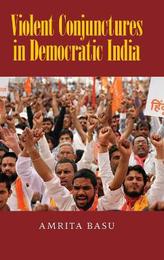
|
Violent Conjunctures in Democratic India
Hardback
Main Details
| Title |
Violent Conjunctures in Democratic India
|
| Authors and Contributors |
By (author) Amrita Basu
|
| Series | Cambridge Studies in Contentious Politics |
|---|
| Physical Properties |
| Format:Hardback | | Pages:357 | | Dimensions(mm): Height 235,Width 160 |
|
| ISBN/Barcode |
9781107089631
|
| Classifications | Dewey:320.540954 |
|---|
| Audience | | Undergraduate | | Postgraduate, Research & Scholarly | |
|---|
| Illustrations |
2 Maps; 9 Line drawings, unspecified
|
|
Publishing Details |
| Publisher |
Cambridge University Press
|
| Imprint |
Cambridge University Press
|
| Publication Date |
30 June 2015 |
| Publication Country |
United Kingdom
|
Description
This book is a pioneering study of when and why Hindu Nationalists have engaged in discrimination and violence against minorities in contemporary India. Amrita Basu asks why the incidence and severity of violence differs significantly across Indian states, within states, and through time. Contrary to many predictions, the Hindu nationalist Bharatiya Janata Party (BJP) has neither consistently engaged in anti-minority violence nor been compelled by the centrifugal pressures of democracy to become a centrist party. Rather, the national BJP has alternated between moderation and militancy. Hindu nationalist violence has been conjunctural, determined by relations among its own party, social movement organization, and state governments, and on the character of opposition states, parties and movements. This study accords particular importance to the role of social movements in precipitating anti-minority violence. It calls for a broader understanding of social movements and a greater appreciation of their relationship to political parties.
Author Biography
Amrita Basu is the author of Two Faces of Protest: Contrasting Modes of Women's Activism in India. She is the editor or co-editor of six books, including Women's Movements in a Global Era: The Power of Local Feminisms and Beyond Exceptionalism: Violence, Religion and Democracy in India. She has received research support from the National Endowment for the Humanities, the Social Science Research Council, the John D. and Catherine T. MacArthur Foundation, and the American Institute of Indian Studies. She is a member of the Council of the American Political Science Association and Vice President of the American Institute of Indian Studies. She is on the editorial boards of the International Political Science Review, American Political Science Review, the International Feminist Journal of Politics, Meridians: Feminism, Race, Transnationalism, and Critical Asian Studies. She was previously the South Asia editor for The Journal of Asian Studies.
Reviews'Amrita Basu's richly researched, theoretically informed and multifaceted study revisits the question of the relationship between Hindu nationalism and communal violence. It breaks new ground by its nuanced and detailed examination of the relationship among federal states, party and social movement organizations.' Susanne Hoeber Rudolph, William Benton Distinguished Service Professor of Political Science Emerita, and Lloyd I. Rudolph, Emeritus Professor of Political Science, University of Chicago 'This book presents a comprehensive picture of the Hindu nationalist movement in more than one way. Not only does it not separate its political facade, the BJP, from the rest of the 'Sangh Parivar' - that Amrita Basu pertinently analyzes in terms of a social movement - but it also does not insulate the electoral politics of the Hindutva forces from its use of communal violence whose facets (including the economic and caste-based ones) are deciphered via well-chosen case studies. The whole demonstration is administered with special references to four major states of India - UP, Gujarat, Rajasthan and HP - whose comparisons show unexpected variations.' Christophe Jaffrelot, Professor, King's College London and Sciences Po (Paris) and Research Director at the CNRS (Centre National de la Recherche Scientifique) 'Violent Conjunctures in Democratic India situates India's now-reigning party, the BJP, in a deeply illuminating comparative perspective. Through her analysis of four Indian states, Basu offers a revelatory treatment of the BJP's swings between 'moderation and militancy'. Elucidating the too-rarely-investigated conjunctures of social movements and political parties, Basu's work will be vital reading to Indianists and to students of global politics alike.' Mary Fainsod Katzenstein, Cornell University, New York 'Amrita Basu brings the eye of the political scientist to local realities and the eye of the anthropologist to aggregate national patterns in this remarkable study of ethnic violence in India in the last four decades. Her ability to shift roles, views, and scales sheds new light on why the steady role of democratic institutions in Indian politics has been accompanied by party-led violence against minorities of every type in India. This study sets new standards for our understanding of the mass politics of hate and will be an invaluable guide to social scientists, critical humanists, and public intellectuals working on the paradoxes of democracy anywhere in the world.' Arjun Appadurai, New York University 'This book should be read not only by those interested specifically in mobilization and social movements, but anyone who wants greater insight into the types of majoritarian politics that seem to be gaining momentum around the globe, most especially in democratic countries. Scholars of such topics will not find a single easy or simple answer to the difficult questions tackled in this book, but they can expect to find answers that actually explain.' Rina Verma Williams, Mobilization
|